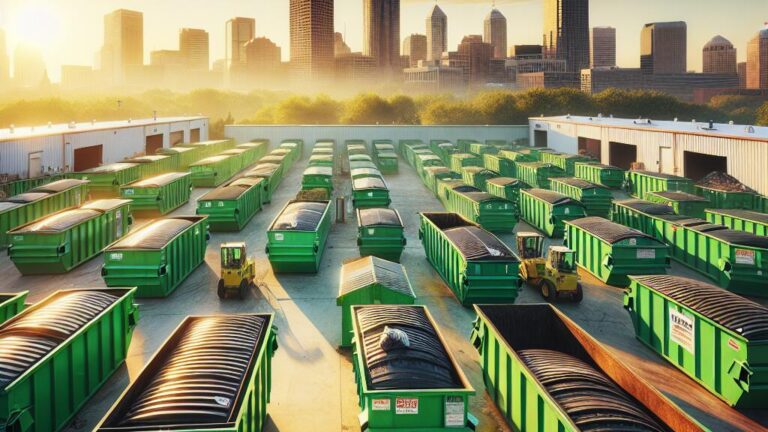What to Expect When Renting a Commercial Dumpster
Proper Loading Techniques
When using a commercial dumpster, understanding how to load it efficiently is essential for maximizing space and ensuring safety. Start by placing larger items at the bottom. This approach creates a stable base and allows smaller debris to fill in around them. Keeping heavier items low helps avoid tipping hazards when the dumpster is moved. It’s important to distribute weight evenly throughout the container to prevent shifts during transport.
Another key aspect of proper loading is ensuring that the contents do not exceed the rim of the dumpster. Overfilled containers can lead to fines and complications during pickup. To optimize the available space, break down larger items like furniture or cardboard boxes. This practice not only increases capacity but also makes the unloading process simpler. Strive for a neatly packed dumpster by arranging materials thoughtfully and compactly.
Maximizing Space for Efficiency
When loading a commercial dumpster, it is crucial to arrange items in a way that optimizes the available space. Begin by breaking down larger items like furniture or cardboard boxes. This technique not only creates more room but also allows for better weight distribution. Place heavier items at the bottom and distribute lighter materials on top. Avoid tossing materials haphazardly. Instead, stack or layer them strategically to maximize the entire container’s capacity.
Consider the types of waste being disposed of as well. Grouping similar materials together, such as wood, metal, or mixed debris, can help fill gaps and prevent wasted space. Additionally, utilizing a tarping system can allow for items to be safely piled higher without risking spillage. Proper loading techniques contribute to efficiency and can potentially lower overall disposal costs by reducing the need for additional pickups.
Rental Duration and Flexibility
When considering a dumpster rental, it’s important to evaluate your project timeline. Many companies offer both short-term and long-term rental options. Short-term rentals are ideal for quick jobs, such as cleanouts or renovations, allowing you to manage waste efficiently without committing to an extended period. Long-term rentals can benefit ongoing projects, such as construction or ongoing business operations, providing the flexibility to keep the dumpster until the work is complete.
Understanding your specific needs can help you choose the right rental duration. Some companies may allow you to change the rental period based on project requirements. In addition to standard rental durations, many providers offer options for extensions or pickups as needed. This adaptability can be crucial for managing unexpected delays or changes in project scope.
Options for ShortTerm vs LongTerm Rentals
When considering dumpster rental, businesses must evaluate their specific needs to determine whether a short-term or long-term option is best suited. Short-term rentals cater to projects with set timelines, such as renovations or cleanouts, typically lasting a few days to a few weeks. These options provide flexibility and can be beneficial for seasonal activities or one-time events, ensuring that waste is cleared promptly without commitment.
Long-term rentals, on the other hand, often serve ongoing operations like construction sites or regular business waste management. Understanding the duration of a project helps in choosing the right rental period. Providers usually offer competitive rates for extended rentals, making it more economical for businesses that anticipate consistent waste production over time. Evaluating both options based on frequency of use and project duration will help in making an informed decision.
Waste Management Regulations
Understanding the complexity of waste management regulations is crucial when renting a commercial dumpster. Each locality has its own set of rules governing disposal practices. These regulations often outline what materials can be placed in dumpsters and which ones require special handling. Hazardous waste, electronics, and large appliances typically fall under strict guidelines. Failure to adhere to these regulations can lead to fines and additional charges, making it important to familiarize yourself with your area’s requirements.
Compliance with local laws reflects a commitment to responsible business practices. Checking with local waste management authorities can provide clear guidelines on what is acceptable for disposal. Some areas may require permits for placing a dumpster, especially in high-traffic zones. Being proactive in understanding these regulations not only ensures smooth operations but also contributes to environmental responsibility.
Local Laws to Be Aware Of
Before renting a commercial dumpster, familiarize yourself with local regulations that govern waste disposal. Many municipalities enforce specific rules regarding the types of materials that can be discarded in dumpsters. Some may prohibit hazardous materials, electronics, or certain types of construction debris due to their potential environmental impacts. Violating these regulations can lead to fines and additional charges, making it crucial to understand what is acceptable in your area.
Understanding permit requirements is equally important. Some locations may require you to obtain a permit if the dumpster will occupy a public space, such as a street or sidewalk. Procedures for obtaining these permits can vary significantly depending on your city or county. Delays in acquiring the necessary documentation could hinder your project timeline, emphasizing the need for diligence in checking local laws before scheduling a rental.
Responsible Disposal Practices
Disposing of waste responsibly is essential for maintaining a clean environment and adhering to local regulations. When using a commercial dumpster, it’s important to separate recyclables from regular waste. Many items such as paper, plastics, and metals can be recycled rather than sent to a landfill. Familiarizing yourself with the recycling guidelines in your area ensures that you maximize the benefits of your efforts while minimizing contamination.
Another key aspect of responsible disposal practices involves being mindful of hazardous materials. Certain items like batteries, electronics, and chemicals require special handling and cannot be placed in general waste bins. Not only does this practice help protect the environment, but it also prevents potential fines and penalties from violating local waste management laws. Understanding these requirements can lead to more effective waste management and promote sustainability in your business.
Recycling and Sustainability Tips
Implementing responsible disposal practices is essential for promoting sustainability. Begin by sorting waste materials appropriately. Separate recyclables such as paper, glass, metal, and plastic from non-recyclable trash. Familiarizing yourself with local recycling policies can enhance your efforts. Many communities provide specific guidelines on what materials can be recycled and how to prepare them for collection. Having designated bins for different types of waste can streamline this process and ensure proper disposal.
Consider partnering with a waste management provider that prioritizes eco-friendly practices. Some companies offer services that focus on recycling and composting, which can significantly reduce the amount of waste sent to landfills. Educating employees about recycling initiatives is also crucial. Awareness campaigns can increase participation in recycling programs, reducing overall waste generation. By adopting these practices, businesses can contribute positively to environmental sustainability while making effective use of their dumpster rentals.
FAQS
What is a commercial dumpster, and why would I need one?
A commercial dumpster is a large container used for collecting and disposing of waste generated by businesses or construction sites. You might need one for renovations, large cleanouts, or regular waste management to keep your property neat and compliant with local regulations.
How do I determine the right size dumpster for my needs?
To determine the right size dumpster, consider the volume of waste you expect to generate. Most rental companies offer a range of sizes, from 10 to 40 cubic yards. Assess your project scope and consult with the rental provider for recommendations based on your specific needs.
Are there items that I cannot dispose of in a commercial dumpster?
Yes, there are typically restrictions on hazardous materials, such as chemicals, batteries, and certain electronics. It’s important to check with your rental provider for a complete list of prohibited items to ensure compliance with local waste management regulations.
How long can I keep the dumpster, and what are my options for extending the rental?
Rental durations vary depending on the provider, but you can often choose between short-term and long-term rentals. If you need to extend your rental, contact your provider as soon as possible to discuss availability and any potential additional fees.
What are some best practices for loading a dumpster to maximize space?
To maximize space, break down large items, distribute weight evenly, and avoid overfilling the dumpster. Layering materials and placing heavier items at the bottom will help ensure efficient use of the available space and facilitate safe transport.







